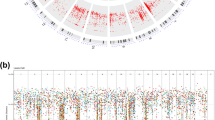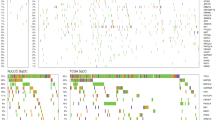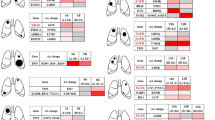Abstract
Germline LKB1 mutations cause Peutz–Jeghers syndrome, a hereditary disorder that predisposes to gastrointestinal hamartomatous polyposis and several types of malignant tumors. Somatic LKB1 alterations are rare in sporadic cancers, however, a few reports showed the presence of somatic alterations in a considerable fraction of lung cancers. To determine the prevalence and the specificity of LKB1 alterations in lung cancers, we examined a large number of lung cancer cell lines and lung adenocarcinoma (AdC) specimens for the alterations. LKB1 genetic alterations were frequently detected in the cell lines (21/70, 30%), especially in non-small cell lung cancers (NSCLCs) (20/51, 39%), and were significantly more frequent in cell lines with KRAS mutations. Point mutations were detected only in AdCs and large cell carcinomas, whereas homozygous deletions were detected in all histological types of lung cancer. Among lung AdC specimens, LKB1 mutations were found in seven (8%) of 91 male smokers but in none of 64 females and/or nonsmokers, and were significantly more frequent in poorly differentiated tumors. The difference in the frequency of LKB1 alterations between cell lines and tumor specimens was likely to be owing to masking of deletions by the contamination of noncancerous cells in the tumor specimens. These results indicate that somatic LKB1 genetic alterations preferentially occur in a subset of poorly differentiated lung AdCs that appear to correlate with smoking males.
This is a preview of subscription content, access via your institution
Access options
Subscribe to this journal
Receive 50 print issues and online access
$259.00 per year
only $5.18 per issue
Buy this article
- Purchase on Springer Link
- Instant access to full article PDF
Prices may be subject to local taxes which are calculated during checkout



Similar content being viewed by others
References
Alessi DR, Sakamoto K, Bayascas JR . (2006). Lkb1-dependent signaling pathways. Annu Rev Biochem 75: 137–163.
Avizienyte E, Loukola A, Roth S, Hemminki A, Tarkkanen M, Salovaara R et al. (1999). LKB1 somatic mutations in sporadic tumors. Am J Pathol 154: 677–681.
Baas AF, Smit L, Clevers H . (2004). LKB1 tumor suppressor protein: PARtaker in cell polarity. Trends Cell Biol 14: 312–319.
Bignell GR, Barfoot R, Seal S, Collins N, Warren W, Stratton MR . (1998). Low frequency of somatic mutations in the LKB1/Peutz–Jeghers syndrome gene in sporadic breast cancer. Cancer Res 58: 1384–1386.
Burbee DG, Forgacs E, Zochbauer-Muller S, Shivakumar L, Fong K, Gao B et al. (2001). Epigenetic inactivation of RASSF1A in lung and breast cancers and malignant phenotype suppression. J Natl Cancer Inst 93: 691–699.
Carretero J, Medina PP, Pio R, Montuenga LM, Sanchez-Cespedes M . (2004). Novel and natural knockout lung cancer cell lines for the LKB1/STK11 tumor suppressor gene. Oncogene 23: 4037–4040.
Fujita T, Kiyama M, Tomizawa Y, Kohno T, Yokota J . (1999). Comprehensive analysis of p53 gene mutation characteristics in lung carcinoma with special reference to histological subtypes. Int J Oncol 15: 927–934.
Ghaffar H, Sahin F, Sanchez-Cepedes M, Su GH, Zahurak M, Sidransky D et al. (2003). LKB1 protein expression in the evolution of glandular neoplasia of the lung. Clin Cancer Res 9: 2998–3003.
Guldberg P, thor Straten P, Ahrenkiel V, Seremet T, Kirkin AF, Zeuthen J . (1999). Somatic mutation of the Peutz–Jeghers syndrome gene, LKB1/STK11, in malignant melanoma. Oncogene 18: 1777–1780.
Hearle NC, Rudd MF, Lim W, Murday V, Lim AG, Phillips RK et al. (2006). Exonic STK11 deletions are not a rare cause of Peutz–Jeghers syndrome. J Med Genet 43: e15.
Hearle NC, Tomlinson I, Lim W, Murday V, Swarbrick E, Lim G et al. (2005). Sequence changes in predicted promoter elements of STK11/LKB1 are unlikely to contribute to Peutz–Jeghers syndrome. BMC Genomics 6: 38.
Hemminki A . (1999). The molecular basis and clinical aspects of Peutz–Jeghers syndrome. Cell Mol Life Sci 55: 735–750.
Hemminki A, Markie D, Tomlinson I, Avizienyte E, Roth S, Loukola A et al. (1998). A serine/threonine kinase gene defective in Peutz–Jeghers syndrome. Nature 391: 184–187.
Jenne DE, Reimann H, Nezu J, Friedel W, Loff S, Jeschke R et al. (1998). Peutz–Jeghers syndrome is caused by mutations in a novel serine threonine kinase. Nat Genet 18: 38–43.
Karuman P, Gozani O, Odze RD, Zhou XC, Zhu H, Shaw R et al. (2001). The Peutz-Jegher gene product LKB1 is a mediator of p53-dependent cell death. Mol Cell 7: 1307–1319.
Kishimoto M, Kohno T, Okudela K, Otsuka A, Sasaki H, Tanabe C et al. (2005). Mutations and deletions of the CBP gene in human lung cancer. Clin Cancer Res 11: 512–519.
Kosaka T, Yatabe Y, Endoh H, Kuwano H, Takahashi T, Mitsudomi T . (2004). Mutations of the epidermal growth factor receptor gene in lung cancer: biological and clinical implications. Cancer Res 64: 8919–8923.
Launonen V . (2005). Mutations in the human LKB1/STK11 gene. Hum Mutat 26: 291–297.
Matsumoto S, Iwakawa R, Kohno T, Suzuki K, Matsuno Y, Yamamoto S et al. (2006a). Frequent EGFR mutations in noninvasive bronchioloalveolar carcinoma. Int J Cancer 118: 2498–2504.
Matsumoto S, Takahashi K, Iwakawa R, Matsuno Y, Nakanishi Y, Kohno T et al. (2006b). Frequent EGFR mutations in brain metastases of lung adenocarcinoma. Int J Cancer 119: 1491–1494.
Park MJ, Shimizu K, Nakano T, Park YB, Kohno T, Tani M et al. (2003). Pathogenetic and biologic significance of TP14ARF alterations in nonsmall cell lung carcinoma. Cancer Genet Cytogenet 141: 5–13.
Sanchez-Cespedes M, Ahrendt SA, Piantadosi S, Rosell R, Monzo M, Wu L et al. (2001). Chromosomal alterations in lung adenocarcinoma from smokers and nonsmokers. Cancer Res 61: 1309–1313.
Sanchez-Cespedes M, Parrella P, Esteller M, Nomoto S, Trink B, Engles JM et al. (2002). Inactivation of LKB1/STK11 is a common event in adenocarcinomas of the lung. Cancer Res 62: 3659–3662.
Shigematsu H, Gazdar AF . (2006). Somatic mutations of epidermal growth factor receptor signaling pathway in lung cancers. Int J Cancer 118: 257–262.
Su GH, Hruban RH, Bansal RK, Bova GS, Tang DJ, Shekher MC et al. (1999). Germline and somatic mutations of the STK11/LKB1 Peutz–Jeghers gene in pancreatic and biliary cancers. Am J Pathol 154: 1835–1840.
Tiainen M, Vaahtomeri K, Ylikorkala A, Makela TP . (2002). Growth arrest by the LKB1 tumor suppressor: induction of p21(WAF1/CIP1). Hum Mol Genet 11: 1497–1504.
Tomizawa Y, Kohno T, Kondo H, Otsuka A, Nishioka M, Niki T et al. (2002). Clinicopathological significance of epigenetic inactivation of RASSF1A at 3p21.3 in stage I lung adenocarcinoma. Clin Cancer Res 8: 2362–2368.
Upadhyay S, Liu C, Chatterjee A, Hoque MO, Kim MS, Engles J et al. (2006). LKB1/STK11 Suppresses Cyclooxygenase-2 Induction and Cellular Invasion through PEA3 in Lung Cancer. Cancer Res 66: 7870–7879.
Volikos E, Robinson J, Aittomaki K, Mecklin JP, Jarvinen H, Westerman AM et al. (2006). LKB1 exonic and whole gene deletions are a common cause of Peutz–Jeghers syndrome. J Med Genet 43: e18.
Westerman AM, Entius MM, de Baar E, Boor PP, Koole R, van Velthuysen ML et al. (1999). Peutz–Jeghers syndrome: 78-year follow-up of the original family. Lancet 353: 1211–1215.
Zhong D, Guo L, de Aguirre I, Liu X, Lamb N, Sun SY et al. (2006). LKB1 mutation in large cell carcinoma of the lung. Lung Cancer 53: 285–294.
Acknowledgements
This work was supported by Grants-in-Aid from the Ministry of Health, Labor and Welfare of Japan for the 3rd-term Comprehensive 10-year Strategy for Cancer Control and for Cancer Research (16-1), from the program for promotion of Fundamental Studies in Health Sciences of the National Institute of Biomedical Innovation (NiBio), and from National Cancer Institute Lung Cancer SPORE (Grant Number: P50CA70907).
Author information
Authors and Affiliations
Corresponding author
Additional information
Supplementary Information accompanies the paper on the Oncogene website (http://www.nature.com/onc).
Supplementary information
Rights and permissions
About this article
Cite this article
Matsumoto, S., Iwakawa, R., Takahashi, K. et al. Prevalence and specificity of LKB1 genetic alterations in lung cancers. Oncogene 26, 5911–5918 (2007). https://doi.org/10.1038/sj.onc.1210418
Received:
Revised:
Accepted:
Published:
Issue Date:
DOI: https://doi.org/10.1038/sj.onc.1210418
Keywords
This article is cited by
-
Oxidative stress-triggered Wnt signaling perturbation characterizes the tipping point of lung adeno-to-squamous transdifferentiation
Signal Transduction and Targeted Therapy (2023)
-
The role of the SNF1 signaling pathway in the growth of Saccharomyces cerevisiae in different carbon and nitrogen sources
Brazilian Journal of Microbiology (2023)
-
AMPK targets a proto-oncogene TPD52 (isoform 3) expression and its interaction with LKB1 suppress AMPK-GSK3β signaling axis in prostate cancer
Journal of Cell Communication and Signaling (2023)
-
LKB1 phosphorylation and deactivation in lung cancer by NNAL, a metabolite of tobacco-specific carcinogen, in an isomer-dependent manner
Oncogene (2022)
-
PIM kinases inhibit AMPK activation and promote tumorigenicity by phosphorylating LKB1
Cell Communication and Signaling (2021)



